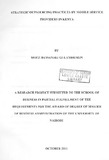| dc.description.abstract | Business process outsourcing is a process whereby a company outsourcers its operations
to a service provider, whose core competence is centered on those processes. The
company is likely to experience service improvements that can be turned into competitive
advantages over rivals and offer cost benefits, flexibility and reduced capital investment.
Business process outsourcing is used to deliver value to customers or as the movement of
business processes from inside the organization to external service providers, hence the
company retains only processes that it considers core to its operation.
The purpose of this study was to determine the application of outsourcing strategy in the
overall operation of mobile phone operators in Kenya, to determine the benefits and
challenges of this form of outsourcing and how these challenges are being dealt with. The
research design used was the census descriptive survey method and data was collected
from all the four existing mobile phone operators. The respondents comprised of the
various head of departments, the CEO, CTO and Chief Operating Officers (COO). A
semi-structured questionnaire was used with close ended and open ended questions.
Primary data was collected from the respondents and analyzed using frequencies and
percentages. The findings were presented in form of tables and figures.
The Study found that top level management was involved in the outsourcing decision
making. Focus on core business was considered highly while cost reduction, improved
quality of service, increased competitiveness, and increased flexibility were key factors
when deciding on the outsourcing strategy. Outsourcing was considered a long term
vi
strategy to reach certain objectives as opposed to a short term solution. Cost - Benefit
analysis, case study and prioritization were the most common tools used to formulate an
outsourcing strategy. Horizontal communication was used mostly to effectively
communicate the outsourcing intent, while the mode of business process outsourcing that
had been mostly adopted was onshore. On the challenges in outsourcing strategies, the
study concludes that there were numerous outsourcing challenges encountered in
outsourcing strategies, most respondents strongly agreed that the fear of job loss and fear
of change was an outsourcing challenge, hidden costs and risks was agreed to be a
challenge encountered in outsourcing strategies. On the ways of dealing with these
challenges, a number of methods were adopted; flexible contract terms, deadlines,
Service Level Agreements (SLA), contracts and imposing penalties were the most
common methods used. | en |

